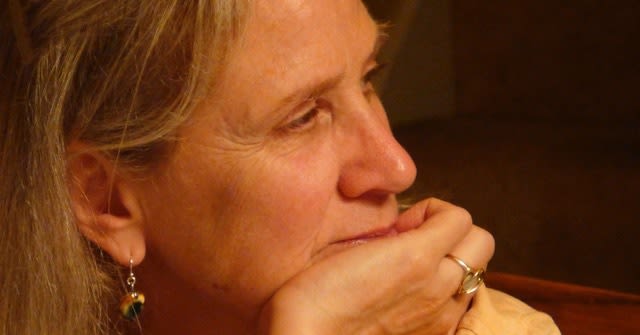A Local Doctor Shares the Stories of Homeless and Impoverished Portlanders

Dr. Kullberg served as the medical director for the Multnomah County Health Department for two decades.
We humans have a serious “othering” problem. Whether on the basis of skin color, sexual orientation, or social class, it's far too easy to ignore people who are different from us. Patricia Kullberg, MD, wants to change that. A Portland native, Dr. Kullberg served as the medical director for the Multnomah County Health Department for two decades. With her book On the Ragged Edge of Medicine: Doctoring Among the Dispossessed, she attempts to break the wall between the homed and the homeless, while exposing the class distinctions that make that barrier so strong. Hear more from Dr. Kullberg on Monday, June 26, at 7:30 p.m. at Powell’s City of Books.
You’ve worked in medicine, but also you’re an author. Which came first for you?

The medicine, for sure. I got my interest in medicine from my dad; he was a doctor. Being a child of the ’60s, I think I had these ambitions of being a great savior, and that didn’t exactly pan out.
I took the medical director shift at the Multnomah County Health Department. It’s largely administrative, but I chose to work part-time in a little tiny clinic on Burnside. It was largely a homeless population that we were serving. I later went to a larger clinic on Stark, which served not only homeless, but a lot of immigrants and refugees and inner city urban poor people.
I started writing a few years into my practice to work through stuff; I would have encounters that were very troubling on many different levels. When I retired, I was inspired to go back to it. I was taking writing classes at Portland State University and I found that, having retired, I could set aside a lot of things that I’d been holding on. I’d felt that I had to think of myself in a certain way and project a certain image, and I let go of that because I wasn’t there anymore. So that enabled me to go deeper and do the book.
Tell me more about your thoughts on privilege, and how that affected working at this clinic and putting this book together.
[At first], I think I had this kind of patronizing, paternalistic, “I’m gonna help you people” kind of [mentality], and I didn’t actually take into account who these people were. I was raised here in Portland, [in an] upper middle class home and pretty sheltered— what did I know? It was hard to hang onto those attitudes when I started meeting folks and getting to know them as individuals. I would be kind of astounded sometimes, and very humbled, because I don’t think I could have survived some of the things that I would hear about.
The one thing [the clinic] didn’t attend to very much was class issues. By virtue of working in the health department, everyone was somewhat lifted out….they were no longer impoverished, and every one of our clients was still living in poverty, so there was this divide. I didn’t have a white coat, but I had a stethoscope around my neck, and I’m the doctor, and I’m white. There was all that authority there, and then there’s this person there that you want to be honest and authentic with you. I don’t think people dealt with it head-on very effectively, and I found it hard.
The book is composed of 15 vignettes. How did it feel to put all these stories together?
When I was working at the clinic, I would get to know how people lived, and the challenges that they faced. I felt that people who weren’t living in those conditions would have no idea about how difficult and challenging these lives were, and I wanted to pull the veil back on that a little bit, especially now that the country is so divided. People are not looking at each other, and I just think that we need to do more of that.

Dr. Patricia Kullberg, author of On the Ragged Edge of Medicine
Image: Courtesy Patricia Kullberg
How was working with this particular group of people helpful for addressing your problems with our medical system?
I think that when you get to the margins of a system, you really start to see where things break down and the many ways that a system is flawed. If you’ve got good insurance and you have your mind intact and you’ve had some health literacy, you can negotiate a system that’s not very functional. Once you get out there where resources are poor, the problems become much more stark, and you can see the contradictions more clearly.
What kind of reaction do you hope people have?
A couple big things: one is that these people are not “other.” I think the people who are going to read this are going to be people like me, in the same privilege. I want them to be able to not "other" these people, and understand that they have the exact same hopes and desires and weaknesses – they’re not different.
The other is to see the systemic depth of it. It’s not a matter of individual failing, and as long as we keep thinking that way, we’re going to continue to marginalize people and make people’s lives miserable.
The group of people that I ended up caring for, they got caught up in all sorts of systemic problems through no fault of their own, or they make a bad mistake and there’s no way out; there’s no forgiveness. A lot of these people were born into crappy circumstances, into generational poverty, cycles that are difficult to break out of. It’s a problem of systems and the way a society is structured; it’s not about individuals and the choices that they make.
Is there anything about the book or your work that you want people to know?
I wanted to honor that work that people did, and not just the docs and nurse practitioners, but the nurses and managers. It’s very difficult work, and it doesn’t get recognized. Primary care is particularly difficult—it is the backbone of medicine. No one is going to fare well if the primary care part of the medical system fails, and it’s not doing very good right now. People don’t want to do it; it’s just too hard, and there’s this vast inequity in terms of comparisons to surgeons, and so people gravitate toward specialties that are better paid and boxed in, and they don’t even have to deal with the entire world. So, a plug for primary care!
Patricia Kullberg
7:30 p.m. Monday, June 26, Powell’s City of Books, FREE




